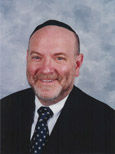MOON LANDINGS AND GOD
From the Cyber Rav-- Rabbi Rafi Rank
rafirank@mjc.org

When Neil Armstrong landed on the moon, just about everyone watching that magical televised moment recalled his famous words, “That’s one small step for man; one giant leap for mankind.” It was a beautiful statement, expertly crafted, though with the transmission between moon and earth somewhat broken up by static, not everyone caught it at first.
Had the first astronaut to land on the moon been a Jew, we would not have heard anything half as creative, but possibly something like Barukh HaShem, “Praise God,” or “Thank God,” the briefest prayer a Jew can make and recited on any occasion that demands gratitude. After that it would have been something about his aching back—he was cooped up in that lunar module for who knows how long—but I do believe that a Jewish astronaut would have had a “Barukh HaShem” on his lips.
Frankly, I can’t think of the moon landing without thinking of the glory of God. I think about what it took to put the Apollo missions together—all the physics, the trigonometry, the calculus, the astronomy, the engineering, the biology, the chemistry, the technology, the catering, the political know-how, the financing, and let’s not forget the vision of the president who first set it up as a goal, John F. Kennedy—all coalescing into an achievement of extraordinary measures, I can’t help but think of a God who implanted within us the spirit of adventure and perseverance to accomplish today what a generation earlier thought to be impossible.
A person less spiritually inclined might argue that there was no miracle involved in that landing because all can be explained in human terms. But the spiritually sensitive might counter that simply because an event is explained in human terms does not necessarily preclude that event from a miraculous underpinning. Another way to put it is in the familiar saying, “the total is greater than the sum of its parts.” The great physicist, Albert Einstein, put it this way—“Not everything that can be counted counts, and not everything that counts can be counted.”
When we read the Shema as recorded in the Torah, we notice that the last letter of Shema, the ayin, in enlarged. And when we read the last word of the Shema, ehad, we notice that the last letter of that word, dalet, is enlarged. The ayin and the dalet combined spell out the Hebrew word: eid, which means witness. The Shema is a reminder that in declaring the oneness of God, we should strive to witness God’s presence in the world in which we live. That does not mean readying ourselves to encounter the extraordinary. That means discovering the extraordinary in every ordinary act we perform or event we encounter. God was with Neil Armstrong as he landed on the moon forty years ago, as sure as God is with us on earth, in all that we do and everywhere we go.
